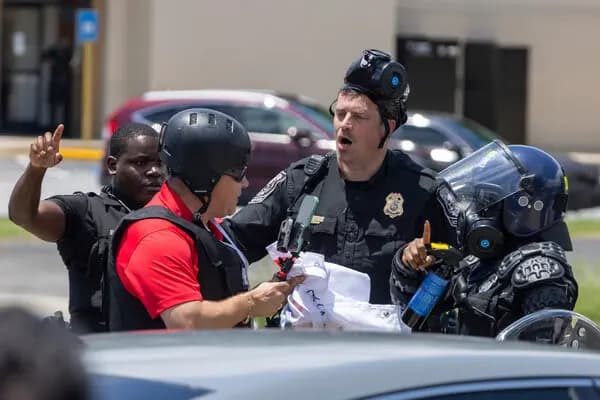We're loading the full news article for you. This includes the article content, images, author information, and related articles.
The violent arrest of a US journalist by federal agents in Chicago has ignited a fierce debate about press freedom and law enforcement tactics, drawing parallels to concerns raised by Kenyan journalists regarding their safety and ability to report freely.

A video editor and producer for Chicago's WGN television station, Debbie Brockman, was arrested by masked federal agents on Friday, October 10, 2025, during an Immigration and Customs Enforcement (ICE) raid on the city's North Side. Videos widely shared on social media show Brockman being forcibly taken to the ground, handcuffed, and placed in a van.
The incident has sparked outrage among media organisations and press freedom advocates, raising critical questions about the treatment of journalists covering law enforcement operations.
The arrest occurred amidst heightened immigration enforcement activities in Chicago, part of 'Operation Midway Blitz,' launched by ICE on September 8, 2025. This operation aims to target individuals described as 'criminal illegal aliens' in Chicago and Illinois. As of October 1, 2025, the Department of Homeland Security reported over 800 arrests under this initiative.
Chicago has been a focal point for protests against these ramped-up immigration enforcement efforts. Local residents and officials have voiced strong opposition to what they describe as increasingly combative tactics by federal agents, including instances of detaining US citizens and using chemical agents.
According to a homeland security official, Brockman was accused of assaulting a federal law enforcement officer by throwing objects at a vehicle. However, some witness accounts suggest she did nothing to provoke the arrest. A local resident, Nancy Molden, described the arrest as 'absolutely horrifying,' stating it was the 'most frightening thing' she had seen in her two decades of living in Chicago.
In the widely circulated videos, Brockman can be heard identifying herself, stating, 'I work for WGN. Please let them know.' WGN-TV confirmed her release from federal custody on Friday, October 10, 2025, at 3:00 PM EAT, with no charges filed against her.
The arrest comes just one day after a federal judge in Chicago issued a temporary restraining order, blocking federal agents from using certain forceful tactics to suppress protests or impede journalists. This order was a response to previous incidents, including the use of pepper balls against a journalist and a priest during a protest. Chicago Mayor Brandon Johnson also signed an 'ICE Free Zone' executive order on October 6, 2025, prohibiting federal immigration agents from using city-owned property for their operations.
The incident in Chicago resonates with concerns among Kenyan journalists regarding their safety and freedom to report. In Kenya, journalists operate under constitutional guarantees of press freedom, enshrined in the Constitution of Kenya 2010, the Access to Information Act, 2016, and the Media Council Act, 2013.
Despite this legal framework, Kenyan journalists have faced challenges, including attacks by police, intimidation, and confiscation of equipment. Organisations like Reporters Without Borders have expressed alarm over the decline in press freedom in Kenya, noting an increase in police attacks on reporters during protests and overt government hostility towards the media. The killing of Pakistani journalist Arshad Sharif in Kenya in October 2022 by Kenyan police further underscores these risks.
The Media Council of Kenya is mandated to accredit local and foreign journalists and works towards ensuring a safe and secure environment for media practitioners. However, the ongoing challenges highlight the need for continuous vigilance and accountability to uphold press freedom both internationally and within Kenya.
The legal ramifications of Debbie Brockman's arrest, particularly in light of the recently issued restraining order, will be closely watched. Further, the response of press freedom organisations and potential policy changes regarding the conduct of federal agents during immigration enforcement operations will be critical. In Kenya, continued advocacy for the safety and protection of journalists and adherence to constitutional provisions on media freedom remain paramount.
Keep the conversation in one place—threads here stay linked to the story and in the forums.
Sign in to start a discussion
Start a conversation about this story and keep it linked here.
Other hot threads
E-sports and Gaming Community in Kenya
Active 9 months ago
The Role of Technology in Modern Agriculture (AgriTech)
Active 9 months ago
Popular Recreational Activities Across Counties
Active 9 months ago
Investing in Youth Sports Development Programs
Active 9 months ago